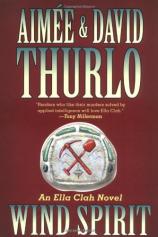Wind Spirit
Review
Wind Spirit
Aimee and David Thurlo have added a ninth installment to their Ella Clah series. These novels take place on a Four Corners, New Mexico reservation where Clah is a special investigator for the Navajo Tribal Police. Her family is "traditionalist" and her brother Clifford is a respected hataalli, or medicine man, who at the start of the book is singing hatals. "These songs of blessing compelled the Navajo gods to bring good luck to the land the yellow dust had corrupted and give it new life. Navajo prayers were not petitions. If recited just right, it was believed that the gods couldn't fail to comply."
The rituals are part of a ceremony to kick off the demolition of warrens of abandoned uranium mines that are a danger to the population. Their demise fills the hopes of the tribe, which are vested in "NEED, which stood for Navajo Electrical Energy Development … the Navajo Nation's first step toward a more prosperous future." The abject poverty on the Rez is palpable and the "lack of funds still took a heavy toll on the tribe's ability to provide and maintain emergency services. Police equipment was badly outdated and salaries hadn't been improved in years. Even the hospital was understaffed."
Ella follows her nephew and his friend when they wander away from the crowd. She sensed the danger they were in as they played "somewhere behind a cluster of boulders several yards away." After a quiet "lecture" about learning patience and warning them about the sick land, her nephew falls off a plank and was pulled into an ever-widening hole. "He dangled helplessly over the edge, staring at her with terrified eyes. 'I'm going to fall!' " Finally, she manages to lift him up to safely. As she tried to save herself, "a wall of sand came sliding down and before she could cry out, Ella felt herself plummeting down a narrow tunnel." When she is found and rescued everyone thinks she is dead. The EMTs are no longer working on her and have covered her with a sheet. At first even her brother considered her to be dead. But after an out-of-body experience, "Ella pushes [the sheet] aside and sits up. No need for CPR … it worked." Ella is back. But for a Navajo just "coming back" is not that easy.
Various and sundry legends, stories, myths and rituals comprise the traditional and modern Navajo belief systems. Some of these are contradictory and put Clah in the strange position of having to prove she has not been "touched" or "contaminated" or "taken over" by evil spirits. She had an experience the year before that convinced her that "she'd discovered … skinwalkers --- Navajo witches known for their practices and rituals associated with the dead --- [who] were using [the] old mines for their own purposes." But on this happy day she was convinced that "skinwalkers had apparently stopped using this site after authorities had destroyed a few of the larger shafts."
Clifford says, "Her wind spirit has drifted. We, as Navajos, are taught that life begins when wind enters the body at birth and that death happens when it leaves through the fingertips. I've tried to convince the [traditionalists] that once the wind spirit leaves … it never returns to the person it left behind. It waits for another to be born. So you couldn't have been dead."
To clear her path and remove the shadow of death that has now shrouded her, Ella must assuage the fears of some of her people. She must be the focus of an obscure ceremony or "Sing" that is required in the circumstances. Clifford tells her, "Only one hataalii knows the Sing you need --- hastiin sdni which means 'old man'; [so aged he] was to be in his nineties. [Unfortunately] the Singer [she needs] has gone off on a spiritual journey. He's visiting the shrines of his clan and could be nearly anywhere." Clah knows she has no choice but to go looking for this person, and the sooner she gets started the sooner the Sing can be performed.
At first she has no luck in tracking the old man down. But in the interim she's called out on a vandalism call and then an arson/murder. Both are connected to the activism of the victims who are fighting for handgun registration on the reservation. The woman who died in the fire had been in a wheelchair for years as a result of a gunshot wound. She and her husband were at the vanguard of the new legislation and obvious targets of the rednecks who saw them as enemies.
As events unfold Ella is caught up in maintaining her dignity and keeping the respect of the people to whom she feels responsible. WIND SPIRIT is a craftily written novel that is rich in Navajo history and life on the reservation. Both the lead and supporting characters are deftly fleshed out, which adds verisimilitude to the different issues that confront them throughout the novel. Tension is high when the vandals keep at their ugly mission, a hostage crisis becomes full blown, and dead bodies mount as gunshots ring out in deafening finality.
By the end of the book Clifford speaks to his sister: "I heard from the hataalii we've all been searching for. He's finished his other business and will be here today. The Sing can begin this afternoon." When he left her and she took stock of her situation she found "it was clear that she'd have her work cut out for her during the coming months [despite the cleansing of the Sing] but for now she'd restore her own inner balance and harmony by joining her family. It was time to walk in beauty."
Reviewed by Barbara Lipkien Gershenbaum on April 17, 2004



